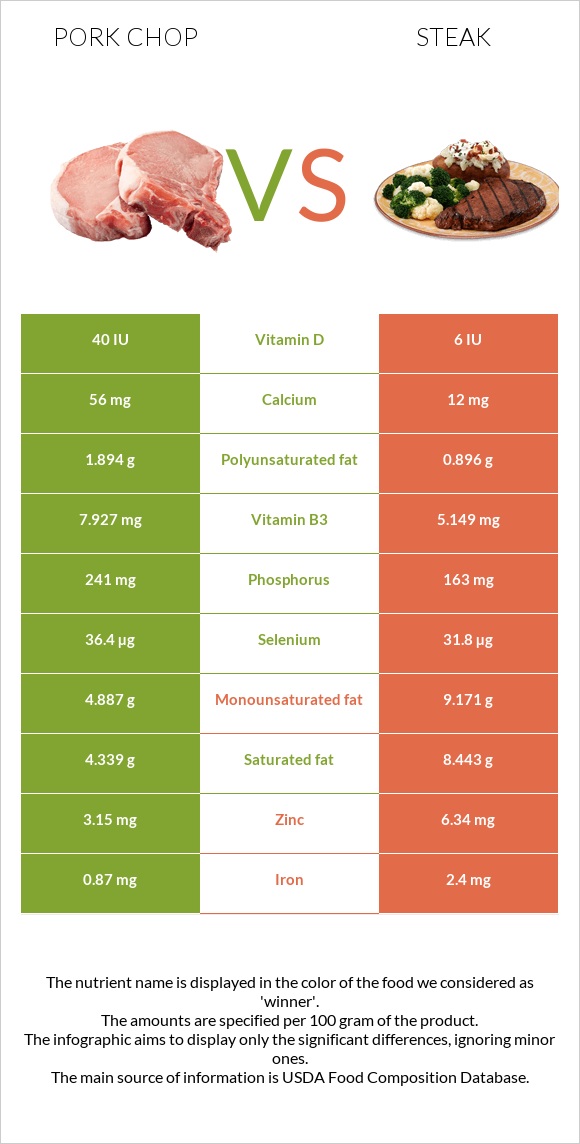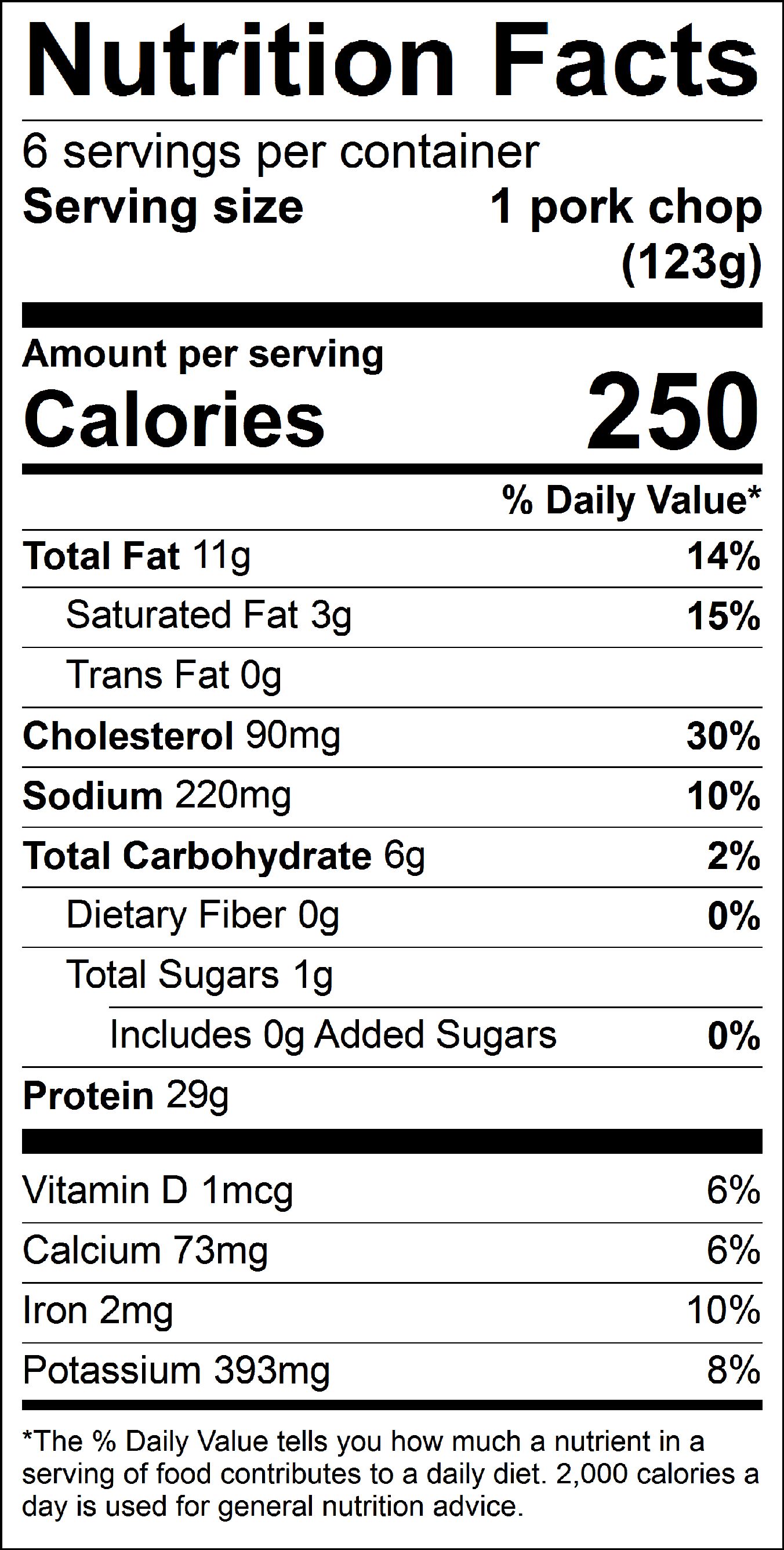Are you curious about what goes into your favorite pork chop? Understanding the nutrition facts can help you make informed choices about what you eat.
Whether you’re grilling, baking, or pan-searing, knowing the nutritional value of pork chops can enhance your culinary experience and support your health goals. Imagine savoring every juicy bite, confident in the knowledge that you’re fueling your body with the right nutrients.
This article will break down everything you need to know about pork chop nutrition, helping you enjoy your meals without any guilt. Get ready to discover how this popular protein can fit perfectly into your balanced diet.

Credit: foodstruct.com
Nutritional Profile Of Pork Chops
Pork chops are a popular choice for those seeking a tasty and nutritious meal. These cuts of meat offer a rich blend of essential nutrients. Understanding their nutritional profile can help you make informed dietary choices. Each component plays a vital role in a balanced diet. Let’s explore the key elements that make pork chops a valuable addition to your meal plan.
Calories And Macronutrients
A typical pork chop contains around 250 calories. This varies based on preparation methods and portion size. Pork chops are a good source of protein and fats. They have minimal carbohydrates. A standard serving provides about 20 grams of protein. It also offers roughly 15 grams of fat. The balance of macronutrients supports energy needs. Keep in mind the calorie count if you’re watching your intake.
Vitamins And Minerals
Pork chops are rich in several essential vitamins and minerals. They contain B vitamins like thiamine, riboflavin, and niacin. These support energy production and brain function. Pork chops also have zinc, vital for immune health. Selenium is another mineral found in pork chops. It plays a role in antioxidant protection. These nutrients contribute to overall health. Eating pork chops can help meet daily vitamin and mineral needs.
Protein Content
Protein is a key component of pork chops. It helps build and repair tissues. A serving provides about 20 grams of protein. This supports muscle health and growth. Protein keeps you full longer. It’s essential for many bodily functions. Pork chops are a great option for protein intake. Including them in meals helps maintain a balanced diet.

Credit: bluejayrx.com
Health Benefits Of Pork Chops
Pork chops are not just delicious; they are packed with nutrients that can offer numerous health benefits. Including pork chops in your diet can support muscle growth, boost your immune system, and promote heart health. You might be surprised at how these benefits can positively impact your well-being.
Supports Muscle Growth
Pork chops are rich in high-quality protein, which is essential for building and repairing muscles. Whether you are lifting weights or just trying to stay active, the protein in pork chops can help you achieve your fitness goals. Think about how much stronger you could become by simply enjoying a tasty pork chop.
Boosts Immune Function
Your immune system relies on various nutrients to function effectively, and pork chops can provide some of these key nutrients. They are a good source of zinc, which plays a crucial role in maintaining a healthy immune response. Imagine feeling more energetic and less prone to illness by adding pork chops to your meals.
Promotes Heart Health
Many people overlook pork chops when considering heart-healthy foods, but they can be a beneficial part of your diet. Lean cuts of pork are lower in saturated fat and can contribute to a balanced diet that supports heart health. Have you ever considered how a well-cooked pork chop could be part of a heart-conscious meal plan?
Incorporating pork chops into your diet might be easier than you think. Whether grilled, baked, or sautéed, these nutritious cuts of meat can enhance your meals and support your health. Next time you’re planning dinner, why not give pork chops a try? Your taste buds and your body will thank you!
Cooking Methods And Nutritional Impact
Pork chops are a delightful addition to any meal. Yet, how you cook them can drastically change their nutritional profile. Different methods can enhance or diminish the health benefits of pork chops. Understanding these impacts can help you make more informed choices. Let’s dive into how various cooking techniques affect the nutrition of pork chops.
Grilled Vs. Fried
Grilling pork chops can be a healthier option compared to frying. When you grill, excess fat drips away, reducing calorie content. The smoky flavor also adds a unique taste without extra calories.
Frying, however, can increase the fat and calorie content significantly. Oils used in frying add extra fats that can affect your heart health. If you love fried pork chops, consider using healthier oils like olive oil and keep the portion size in check.
Baking And Roasting
Baking and roasting are excellent methods for preserving the nutritional value of pork chops. These techniques require minimal oil, keeping the calorie count lower. They also help retain essential vitamins and minerals.
Roasting can bring out a rich flavor while maintaining the juiciness of the pork. A simple seasoning of herbs and spices can enhance the taste without adding unhealthy elements. Do you prefer a crispy outer layer? Roasting at a higher temperature can achieve this without frying.
Marinades And Seasonings
Using marinades can impact the nutrition of your pork chops. Marinades often include oils, sugars, and sodium, which can add extra calories and affect your health. Opt for marinades with vinegar or lemon juice to keep it light.
Seasonings can pack a flavor punch without the extra calories. Fresh herbs, garlic, and pepper can transform your pork chop into a gourmet dish. Have you ever tried a sprinkle of paprika or cumin? These spices add depth and complexity without compromising nutrition.
So, how will you cook your next pork chop? Considering these methods can help you enjoy your meal while staying on track with your health goals. Whether grilling, baking, or experimenting with marinades, the choice is yours!
Selecting Quality Pork Chops
When it comes to enjoying a delicious pork chop, quality matters. Selecting the right cut can significantly impact the taste and nutrition of your meal. Understanding how to choose quality pork chops ensures you get the most out of this versatile protein.
Choosing Lean Cuts
Lean cuts of pork are healthier and offer less fat, making them a great choice for those watching their calorie intake. Look for cuts like the loin, which are typically leaner than others. A simple way to check is to observe the marbling; less visible fat means a leaner piece.
Next time you’re at the store, try comparing the marbling of different cuts. You’ll notice that lean pork chops have finer lines of fat. This means less trimming and more meat on your plate.
Understanding Labels
Labels can be confusing, but they are your best friend when selecting quality pork chops. Look for labels that indicate the meat is certified organic or raised without antibiotics. These labels often mean higher quality and better taste.
Have you ever wondered about terms like “natural” or “pasture-raised”? These terms can vary in meaning, so it’s essential to research or ask your butcher for clarification. Being informed helps you make the best choice for your health and taste buds.
Sustainable Sourcing
Sustainable sourcing not only supports the environment but often results in better quality meat. Seek out pork from farms that use sustainable practices. This can mean better animal welfare and fewer environmental impacts.
Consider asking your local butcher about the origin of their pork. You might discover a new favorite local farm. Supporting these practices can make your meals more satisfying and ethical.
Choosing quality pork chops is about more than just taste. It’s about making informed choices that benefit your health and the planet. Next time you’re at the market, ask yourself: are you making the best choice for you and your family?
Incorporating Pork Chops Into A Balanced Diet
Pork chops offer a good source of protein and essential vitamins like B6 and B12. They also provide important minerals such as zinc and phosphorus, supporting a balanced diet. With their rich nutrient profile, pork chops can be a delicious and nutritious addition to meals.
Incorporating pork chops into a balanced diet can be a tasty and nutritious choice. They are packed with protein and essential vitamins, making them a great addition to your meals. But how do you make sure you’re getting the most out of this delicious meat without going overboard? Let’s dive into some practical ways to enjoy pork chops as part of a balanced diet.Pairing With Vegetables
Pairing pork chops with a variety of vegetables is a smart move. Vegetables like broccoli, carrots, and bell peppers not only add vibrant colors to your plate but also pack a nutritional punch. They are high in fiber and vitamins, which help balance the richness of pork chops. Experiment with different cooking methods to keep your meals exciting. Roasted, grilled, or sautéed veggies can complement pork chops beautifully. What’s your favorite way to enjoy veggies with pork chops?Portion Control Tips
Portion control is key when enjoying pork chops. A serving size of about 3-4 ounces is typically recommended, which is roughly the size of a deck of cards. This ensures you’re getting enough protein without overindulging. Consider slicing your pork chop into smaller pieces before serving. This simple trick can make your plate look fuller, and you might find yourself eating more mindfully. Have you ever tried this method to manage portions?Frequency Of Consumption
How often should you eat pork chops? Moderation is important. You might aim to include pork chops in your meals once or twice a week, depending on your dietary goals and preferences. Balance your protein choices by including other lean meats, seafood, or plant-based proteins on different days. This variety not only keeps your meals interesting but also helps meet your nutritional needs. What other proteins do you enjoy alongside pork chops? Incorporating pork chops into your diet doesn’t have to be a challenge. With a few thoughtful choices, you can relish their flavor while maintaining a balanced lifestyle.
Credit: dinnertonight.tamu.edu
Frequently Asked Questions
What Nutrients Are In Pork Chops?
Pork chops are rich in protein, vitamins, and minerals. They provide vitamin B6, B12, thiamine, and niacin. Additionally, they contain essential minerals like zinc, phosphorus, and selenium. These nutrients support body functions, including immune health and energy production, making pork chops a nutritious choice.
How Many Calories Are In A Pork Chop?
A typical 3-ounce pork chop contains approximately 200 calories. This can vary depending on the cooking method and added ingredients. Grilling or baking without extra fats can help maintain lower calorie counts. Always consider portion size when calculating calorie intake from pork chops.
Is Pork Chop A Good Source Of Protein?
Yes, pork chops are an excellent source of protein. A 3-ounce serving provides about 22 grams of protein. This high protein content supports muscle maintenance and repair. Including pork chops in your diet can help meet daily protein requirements effectively.
Are Pork Chops High In Fat?
Pork chops contain moderate fat levels, mostly unsaturated. A 3-ounce serving has approximately 9 grams of fat. Opt for lean cuts and trim visible fat for a healthier option. Cooking methods like grilling can also reduce fat content, making pork chops a suitable choice for balanced diets.
Conclusion
Pork chops offer a nutritious choice for your meals. Rich in protein, they help build and repair muscles. Essential vitamins, like B6 and B12, support overall health. Minerals such as zinc and iron boost immune function. Cooking methods matter; grilling or baking keeps them healthier.
Consider portion size to maintain balanced eating habits. Pair with vegetables for a well-rounded plate. Enjoying pork chops can fit into a varied and healthy diet. Remember, moderation is key. Savor the flavors while reaping nutritional benefits.